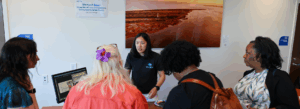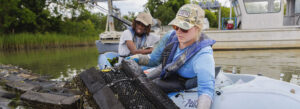Summer resilience interns assist with Arcadis projects
When working to make coastal communities more resilient, you’re bound to cross paths with others. For Amina Rahill-Marier and Katie Coleman, they almost literally did. Rahill-Marier, a civil engineering student at Cornell University, left New York for Virginia, and Coleman, a University of Virginia graduate student in urban planning and design, left Virginia for New York.
Not only were both students interested in resilience, the two spent the summer working as interns for Arcadis, a design and consultancy firm for natural and built assets that partnered with Virginia Sea Grant to create the internship opportunities.
One task brought both students together: testing out a new collaborative session at an established resilience meeting, the Hampton Roads Adaptation Forum.
Designing for Floodtown, USA
The July forum focused around resilience design, and through the work of Rahill-Marier and Coleman, forum attendees practiced resilience design through a collaborative problem-solving session. The session centered around Floodtown, USA: a fictitious but realistic case study for coastal flooding problems.
Equipped with the town’s demographics, aerial street views, and maps outlining critical infrastructure, the forum participants broke into small groups to tackle the town’s flooding problems. The scientists, architects, engineers, planners, community members, and others attendees formed interdisciplinary groups to practice a critical skill for resilience projects: collaboration.
“That best knowledge lies in working with other people,” Rahill-Marier says. “This was an experiment in changing the format of how that forum works, and using it as a collaboration space rather than just presenting things.”
No two towns are alike, and each group considered the environmental, economic, and social factors related to resilience. For Floodtown, this included important roads and buildings in the flood zone, economic investment, and water quality and wetland destruction. Each team combined their collective skillsets to propose solutions for Floodtown. As the teams developed ideas to decrease flooding, they considered the challenge of transitioning from old to new technologies and the pros and cons of different construction management techniques.
Engineering for Resilience
In addition to organizing the session at the Hampton Roads Adaptation Forum, Rahill-Marier contributed to other resilience projects at the Virginia Beach office. She assisted in preparing reports for the Ohio Creek Watershed Project, a resilience initiative for Norfolk.
“I get to use the knowledge every day, and technical communication in the workplace, you don’t really learn that in school—how to write reports, how to interview properly in terms of giving interviews, taking interviews, talking to other professionals who aren’t in your discipline, and being able to explain in non-engineering terms,” Rahill-Marier says.
She also developed computer coding to automate calculations that depend on rainwater data. After continuing her coursework, Rahill-Marier will intern at Arcadis’ Long Island office next summer, where she will continue to learn about water management and resilience engineering.
One project brought them together: testing out a new collaborative session at an established resilience meeting, the Hampton Roads Adaptation Forum.
The session centered around Floodtown, USA: a fictitious but realistic case study for coastal flooding problems.
Designing for Resilience
Coleman’s resilience internship at the Long Island office was close to home—figuratively and literally. As a New York native, Coleman saw the effects of Hurricane Sandy firsthand, sparking her interested in helping communities recover from natural disasters and prepare for future storms. During her summer, Coleman focused her efforts on the Resilience Wilmington project, an assessment of climate risks facing the city of Wilmington, Delaware.
Although not coastal, Wilmington’s riverfront areas make the city vulnerable to flooding during nor’easters and heavy rainstorms. The Arcadis report focuses on how transportation, public health, sewer, and water infrastructure, and waterfront development could be threatened by climate change—and what the city can do to minimize these impacts. Coleman has continued to assist with the project during the semester and will help present the report to Wilmington officials later this winter.
“I think one of the main takeaways I’ve come to learn is just how interdisciplinary resilience practice is,” Coleman says. “There’s a need for skillsets from all those different fields to really address the problem.”
Takeaways:
- Arcadis summer interns worked with professional architects and engineers, assisting with ongoing water management and resilience projects.
- Although the two interns were located at different offices, they worked together to design an interactive case study for participants at a regional resilience meeting.
- One intern has continued a project into the semester and will present the results of her work to local officials this winter. The other intern will work at another Arcadis office as a resilience intern next summer.
Photos and video by Aileen Devlin | Virginia Sea Grant
Story by Madeleine Jepsen | Virginia Sea Grant
Published Dec. 14, 2018.
“That best knowledge lies in working with other people,” Rahill-Marier says. “This was an experiment in changing the format of how that forum works and using it as a collaboration space rather than just a space for giving presentations.”





